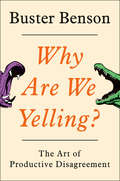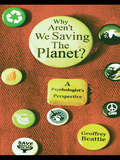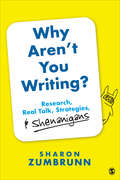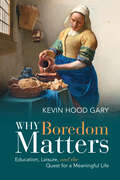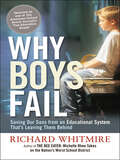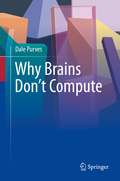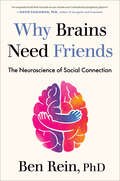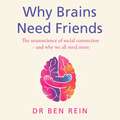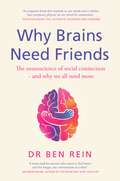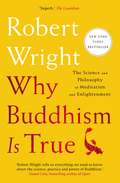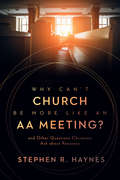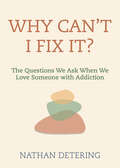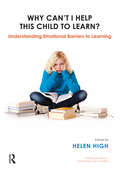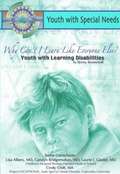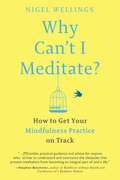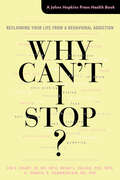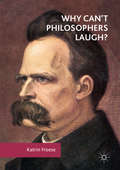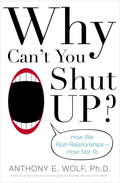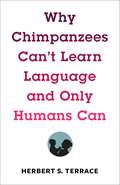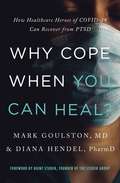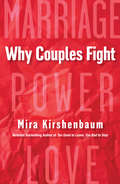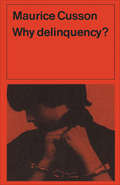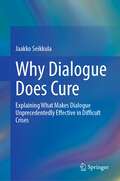- Table View
- List View
Why Are We Yelling?: The Art of Productive Disagreement
by Buster BensonHave you ever walked away from an argument and suddenly thought of all the brilliant things you wish you'd said? Do you avoid certain family members and colleagues because of bitter, festering tension that you can't figure out how to address?Now, finally, there's a solution: a new framework that frees you from the trap of unproductive conflict and pointless arguing forever.If the threat of raised voices, emotional outbursts, and public discord makes you want to hide under the conference room table, you're not alone. Conflict, or the fear of it, can be exhausting. But as this powerful book argues, conflict doesn't have to be unpleasant. In fact, properly channeled, conflict can be the most valuable tool we have at our disposal for deepening relationships, solving problems, and coming up with new ideas.As the mastermind behind some of the highest-performing teams at Amazon, Twitter, and Slack, Buster Benson spent decades facilitating hard conversations in stressful environments. In this book, Buster reveals the psychological underpinnings of awkward, unproductive conflict and the critical habits anyone can learn to avoid it. Armed with a deeper understanding of how arguments, you'll be able to: • Remain confident when you're put on the spot • Diffuse tense moments with a few strategic questions • Facilitate creative solutions even when your team has radically different perspectivesWhy Are We Yelling will shatter your assumptions about what makes arguments productive. You'll find yourself having fewer repetitive, predictable fights once you're empowered to identify your biases, listen with an open mind, and communicate well.
Why Aren't We Saving the Planet?: A Psychologist's Perspective
by Geoffrey BeattieGlobal warming. Many of us believe that it is somebody else’s problem, that it will affect other people and that other people will come up with the solution. This is not true. "Global" warming is a global problem: it will affect every single one of us and will only be stopped by a huge shift in our individual attitudes and behaviour. Each time one of us switches on a light, reaches for something in a supermarket, gets into a car or bus, or even chooses what clothes to buy, we are making a choice that can affect the environment. We already know that we need to start making better choices for the sake of our natural world, now. So why aren’t we already saving the planet? This book follows one psychologist’s mission to find some answers to this question. Challenged by a student to use psychology to find the root of the problem, Geoffrey Beattie (an environmental "unbeliever") begins a personal and life-changing journey of discovery. The reader is invited to accompany him as he uses psychological methods to examine people’s attitudes to global warming. Along the way we find the author’s own attitudes being challenged, as well as our own. This ground-breaking book reflects new and innovative research being carried out into how to change attitudes to the environment and how to encourage sustainable behaviour. It is eminently readable and interesting and, as such, should be read by anyone who is concerned about the future of our planet. In fact, you should also read it if you’re not concerned about our planet.
Why Aren’t You Writing?: Research, Real Talk, Strategies, & Shenanigans
by Sharon K. ZumbrunnWrite more with less pain! Why Aren’t You Writing?: Research, Real Talk, Strategies, & Shenanigans describes research on how bright and otherwise fairly normal people lose their minds when it comes to writing, and then shows the reader how to stop being one of those people. Author Sharon Zumbrunn designed this brief text for beginning and struggling academic writers so they can understand the psychological hang-ups that can get in the way of productivity. This book intertwines social and behavioral science research and humor to offer tips and exercises to help writers overcome their hurdles. Each chapter includes a description of findings from psychological and related research on writing hurdles and personal experiences of the writing process. Within the chapters, the author provides practical strategies and resources to help writers move beyond the challenges holding them back. Why Aren′t You Writing? acknowledges how emotionally and mentally challenging it can be to be a "writer." This book helps readers to balance the hard work required for change with a bit of levity often necessary for withstanding sustained difficult thinking and meaningful change. Together, the components of this text present a systematic approach for beginning and struggling academics to become aware of what might be happening in their heads when they (don’t) write, and harness that knowledge to build a healthier and more resilient relationship with writing.
Why Aren’t You Writing?: Research, Real Talk, Strategies, & Shenanigans
by Sharon K. ZumbrunnWrite more with less pain! Why Aren’t You Writing?: Research, Real Talk, Strategies, & Shenanigans describes research on how bright and otherwise fairly normal people lose their minds when it comes to writing, and then shows the reader how to stop being one of those people. Author Sharon Zumbrunn designed this brief text for beginning and struggling academic writers so they can understand the psychological hang-ups that can get in the way of productivity. This book intertwines social and behavioral science research and humor to offer tips and exercises to help writers overcome their hurdles. Each chapter includes a description of findings from psychological and related research on writing hurdles and personal experiences of the writing process. Within the chapters, the author provides practical strategies and resources to help writers move beyond the challenges holding them back. Why Aren′t You Writing? acknowledges how emotionally and mentally challenging it can be to be a "writer." This book helps readers to balance the hard work required for change with a bit of levity often necessary for withstanding sustained difficult thinking and meaningful change. Together, the components of this text present a systematic approach for beginning and struggling academics to become aware of what might be happening in their heads when they (don’t) write, and harness that knowledge to build a healthier and more resilient relationship with writing.
Why Boredom Matters: Education, Leisure, and the Quest for a Meaningful Life
by Kevin Hood GaryBoredom is an enduring problem. In response, schools often do one or both of the following: first, they endorse what novelist Walker Percy describes as a 'boredom avoidance scheme,' adopting new initiative after new initiative in the hope that boredom can be outrun altogether, or second, they compel students to accept boring situations as an inevitable part of life. Both strategies avoid serious reflection on this universal and troubling state of mind. In this book, Gary argues that schools should educate students on how to engage with boredom productively. Rather than being conditioned to avoid or blame boredom on something or someone else, students need to be given tools for dealing with their boredom. These tools provide them with internal resources that equip them to find worthwhile activities and practices to transform boredom into a more productive state of mind. This book addresses the ways students might gain these skills.
Why Boys Fail: Saving Our Sons from an Educational System That's Leaving Them Behind
by Richard WhitmireThis book takes a hard look at how this ominous reality came to be, how it has worsened in recent years, and why attempts to resolve it often devolve into finger-pointing and polarizing politics. The signs and statistics are undeniable: boys are falling behind in school. Contrary to conventional wisdom, the biggest culprits are not video games, pop culture, or female-dominated schools biased toward girls. The real problem is that boys have been thrust into a bewildering new school environment that demands high-level reading and writing skills long before they can handle them.In Why Boys Fail, you will understand this misunderstood problem and uncover schools that are getting it right by boosting literacy among the entire student body, using:data,interviews,case studies,and clearheaded analysisAmidst the alarming proof of failure among boys, there are also inspiring case studies of schools where something is going right. Each has come up with realistic ways to make sure that every student-male and female-has the tools to succeed in school and later in life.Educators and parents alike will take heart in these promising developments and heed the book's call to action, not only to demand solutions but also to help create them for their own students and children.
Why Brains Don't Compute
by Dale PurvesThis book examines what seems to be the basic challenge in neuroscience today: understanding how experience generated by the human brain is related to the physical world we live in. The 25 short chapters present the argument and evidence that brains address this problem on a wholly trial and error basis. The goal is to encourage neuroscientists, computer scientists, philosophers, and other interested readers to consider this concept of neural function and its implications, not least of which is the conclusion that brains don’t “compute.”
Why Brains Need Friends: The Neuroscience of Social Connection
by Ben Rein PhD"An exquisite book that reminds us our minds aren't soloists but symphony players: we are wired for connection."—David Eagleman, PhD, author of Incognito and LivewiredA neuroscientist&’s guide to boosting your brain health by living a more connected life, and thriving in a post-interaction worldHeadlines have made clear that we are in a crisis of loneliness, but the conversation has yet to explore how spending less time with others can impact the body and mind on a cellular level—and why this knowledge is part of the way forward. Renowned neuroscientist Dr. Ben Rein dives into the fascinating science of social interaction, revealing how our brains are wired for connection and why modern life is challenging those ancient instincts. Through the lens of neuroscience, he explains our need for community and provides new frameworks for bringing togetherness into our lives. Rein uncovers the mesmerizing biological factors at play in our moments together, from small talk with baristas to deep conversation with friends, and shares how to leverage this information to our advantage as we seek happiness and health.Enlightening and empowering, this book reveals:How socializing supports brain health and moodThe hidden dangers of isolation and why it increases the risk of death by any causeWhy the brain experiences virtual conversations differently from in-person encountersThe science of likability and the secrets of making a positive impressionThe neuroscience of empathy, deep bonds, and how we understand othersHow relationships with animals can support our healthHow certain drugs like ecstasy enhance social exchanges, while others like painkillers impair themStrategies for improving your social life to maximize benefits to your mental and physical healthWeaving together cutting-edge scientific discoveries, storytelling, and practical advice inspired by data, Rein reveals how our brains and our bodies are made stronger by connection, and ultimately why brain health is critical to our well-being.
Why Brains Need Friends: The neuroscience of social connection - and why we all need more
by Ben Rein'An exquisite book that reminds us our minds aren't soloists but symphony players: we are wired for connection.'."-David Eagleman, PhD, author of Incognito and Livewired'A must-read for anyone who wants to feel better and live longer, one conversation at a time!' - Dr. Karan Rajan, author of This Book May Save Your LifeFrom your morning coffee order, to weaving through passengers on the train, sitting through tense work meetings, riding in a packed elevator, attending a happy hour with colleagues, or relaxing on the couch with family, every day is filled with social interactions that nurture and support your brain's health. Whether mundane or extraordinary, they collectively make up the 'social diet' that you feed your brain, that influences your well-being, shapes your experience, and, done right, even lengthens your life.In an age of isolation, WHY BRAINS NEED FRIENDS is a neuroscience-backed guide to social interactions, drawing insights from the world of science to help you understand the biology behind your relationships, reconsider the value of companionship, and build a healthier, happier, and more connected life. It's not just what you feed your brain that matters - it's who.
Why Brains Need Friends: The neuroscience of social connection - and why we all need more
by Ben Rein'An exquisite book that reminds us our minds aren't soloists but symphony players: we are wired for connection.'."-David Eagleman, PhD, author of Incognito and Livewired'A must-read for anyone who wants to feel better and live longer, one conversation at a time!' - Dr. Karan Rajan, author of This Book May Save Your LifeFrom your morning coffee order, to weaving through passengers on the train, sitting through tense work meetings, riding in a packed elevator, attending a happy hour with colleagues, or relaxing on the couch with family, every day is filled with social interactions that nurture and support your brain's health. Whether mundane or extraordinary, they collectively make up the 'social diet' that you feed your brain, that influences your well-being, shapes your experience, and, done right, even lengthens your life.In an age of isolation, WHY BRAINS NEED FRIENDS is a neuroscience-backed guide to social interactions, drawing insights from the world of science to help you understand the biology behind your relationships, reconsider the value of companionship, and build a healthier, happier, and more connected life. It's not just what you feed your brain that matters - it's who.
Why Buddhism is True: The Science and Philosophy of Meditation and Enlightenment
by Robert WrightFrom one of America&’s most brilliant writers, a New York Times bestselling journey through psychology, philosophy, and lots of meditation to show how Buddhism holds the key to moral clarity and enduring happiness.At the heart of Buddhism is a simple claim: The reason we suffer—and the reason we make other people suffer—is that we don&’t see the world clearly. At the heart of Buddhist meditative practice is a radical promise: We can learn to see the world, including ourselves, more clearly and so gain a deep and morally valid happiness. In this &“sublime&” (The New Yorker), pathbreaking book, Robert Wright shows how taking this promise seriously can change your life—how it can loosen the grip of anxiety, regret, and hatred, and how it can deepen your appreciation of beauty and of other people. He also shows why this transformation works, drawing on the latest in neuroscience and psychology, and armed with an acute understanding of human evolution. This book is the culmination of a personal journey that began with Wright&’s landmark book on evolutionary psychology, The Moral Animal, and deepened as he immersed himself in meditative practice and conversed with some of the world&’s most skilled meditators. The result is a story that is &“provocative, informative and...deeply rewarding&” (The New York Times Book Review), and as entertaining as it is illuminating. Written with the wit, clarity, and grace for which Wright is famous, Why Buddhism Is True lays the foundation for a spiritual life in a secular age and shows how, in a time of technological distraction and social division, we can save ourselves from ourselves, both as individuals and as a species.
Why Can't Church Be More Like an AA Meeting?: And Other Questions Christians Ask about Recovery
by Stephen R. HaynesDo Christians need recovery? Or is recovery something needed by the church itself? Addiction—whether to a substance or to a behavior—is a problem within faith communities, just like it is everywhere else. But because churches are rarely experienced as safe places for dealing with addiction, co-addiction, or the legacy of family dysfunction, Christians tend to seek recovery from these conditions in Twelve-Step fellowships. Once they become accustomed to the ethos of vulnerability, acceptance, and healing that these fellowships provide, however, they are often left feeling that the church has failed them, with many asking: why can&’t church be more like an AA meeting? Inspired by his own quest to find in church the sort of mutual support and healing he discovered in Twelve-Step fellowships, Stephen Haynes explores the history of Alcoholics Anonymous and its relationship to American Christianity. He shows that, while AA eventually separated from the Christian parachurch movement out of which it emerged, it retained aspects of Christian experience that the church itself has largely lost: comfort with brokenness and vulnerability, an emphasis on honesty and transparency, and suspicion toward claims to piety and respectability. Haynes encourages Christians to reclaim these distinctive elements of the Twelve-Step movement in the process of &“recovering church.&” He argues that this process must begin with he calls &“Step 0,&” which, as he knows from personal experience, can be the hardest step: the admission that, despite appearances, we are not fine.
Why Can't I Fix It?: The Questions We Ask When We Love Someone with Addiction
by Nathan DeteringWhy is this happening? How do you care for yourself and your family? If you are struggling with a loved one’s addiction you are not alone. A compassionate resource for anyone stuck between a rock and a hard place.When Rev. Nathan Detering shared the story of his brother’s death from a drug overdose with the members of his congregation, many of them shared their own addiction stories with him. Realizing the healing power of sharing stories and questions in community, Rev. Detering conducted interviews to identify and address the common questions that haunt us when we love someone with addiction. In conversations both within and outside his community, he heard the palpable need for those struggling with loved one’s addictions to know they are not alone.Weaving together his own and others’ deeply felt experiences of addiction, Why Can’t I Fix It? responds to sometimes desperate questions such as: Why is this happening? What can you do? What can’t you do? How do you care for yourself and the rest of your family? Can you trust your community to support you and your family? While the answers to these questions aren’t easily found, Why Can’t I Fix It? encourages those of us who are struggling with our loved one’s addictions to practice self-care and self-compassion, understand the cultural context for emotional responses and expectations of ourselves and others, and reach out for support.
Why Can't I Help this Child to Learn?: Understanding Emotional Barriers to Learning (United Kingdom Council For Psychotherapy Ser.)
by Helen HighThe book outlines theories of child development from the point of view of the kinds of relationships children make with adults and the effects of their relationships on their learning. In addition, anxieties that some children show about reading, writing and arithmetic are described. In exploring these issues the book draws on Attachment Theory and on Psychoanalytic theories of emotional development. It includes detailed case studies to illustrate ways in which children's learning can be hindered by their difficulties in relating to teachers and the feelings and fantasies that some children have about words and letters. There has been recent political concern that children should all learn to read in their early years at school and extra help should be offered to those who are falling behind. The expectation in political circles seems to be, however, that straightforward extra help with reading will be sufficient, in all cases, to enable a child who has fallen behind to catch up. There has been no general recognition of the need to address underlying emotional problems in some cases, such as those described in this book.
Why Can't I Learn like Everyone Else? Youth with Learning Disabilities (Youth with Special Needs)
by Shirley BrinkerhoffWhen Charlie Begay starts first grade, he soon discovers that he simply cannot learn to read the way the other students do. Unable to understand why, he comes up with this explanation: "There's something wrong with my brain." Convinced that he is "dumb," Charlie goes about solving his problem in the only way he knows how, by "bartering" with his friend Jake: Charlie teaches Jake to skateboard, and in return, Jake reads their homework aloud and writes out Charlie's assignments for him. Their arrangement continues well into seventh grade. Then Charlie's father marries a woman who has a learning disability herself, and everything about Charlie's life begins to change. Millions of students today struggle with learning disabilities like dyslexia, dyscalculia, and dysgraphia. Yet many of these students have little or no idea why learning is so difficult and frustrating for them, that they have a learning disability, or that help is available. Instead, many students who struggle with learning decide they are unintelligent and give up on education. Up to 40 percent of young people with learning disabilities even decide to quit high school. Why Can't I Learn Like Everyone Else? Youth with Learning Disabilities examines the most common learning disabilities. It explains in a clear and understandable way how these conditions are diagnosed and what help is available to students who have them.
Why Can't I Meditate?: How to Get Your Mindfulness Practice on Track
by Nigel WellingsAn accessible guide from an expert on Mindfulness on how to get the most out of meditation--and make the practice a permanent part of your daily life.Meditation is supposed to be a practice that's relaxing and beneficial...so why is it so hard to commit to? While many people have taken workshops in meditation, a significant number don't maintain their practice for long after the class is finished. Mindfulness can help us relax and is great for coming to grips with thoughts that make us depressed or anxious, but it can also bring us into a more intimate relationship with ourselves--a prospect that can make some feel uncomfortable. Yes, lots of good things come out of meditation practice, but keeping it up is challenging. This is where Why Can't I Meditate? comes in. Full of practical ways to help our mindfulness practice flourish, it also features guidance from a wide spectrum of secular and Buddhist mindfulness teachers, and personal accounts by new meditators on what they find difficult and what helps them overcome those blocks. It takes what is boring, painful, or downright scary about meditating and shows how these struggles can become an invaluable part of our path. If you have been considering meditating but doubted your ability, if you are having a hard time continuing, or if you've reluctantly stopped, Why Can't I Meditate? will help you get your mindfulness practice back on track.
Why Can't I Stop?: Reclaiming Your Life from a Behavioral Addiction (A Johns Hopkins Press Health Book)
by Jon E. Grant Brian L. Odlaug Samuel R. ChamberlainA life-changing book for anyone caught in the whirlpool of a behavioral addiction.At some point in our lives, we all engage in behaviors that are risky, irrational, or unwise. We might find it exciting and temporarily rewarding to gamble on the lottery or impulsively buy an expensive gadget. But just as substances like alcohol and narcotics have the potential to become addictive, so do certain behaviors. A person addicted to gambling, shopping, the internet, food, or picking at their skin may suffer shame in the shadows while their behavior consumes time and energy and disrupts their life. Some people with behavioral addictions lose their family, job, savings, and home. With a physical basis in the brain, behavioral addictions are serious illnesses—but simply willing yourself to stop is usually not enough.Why Can't I Stop? is for anyone who has a behavioral addiction, as well as their supportive families and friends. Examining seven of the most common and serious addictions—gambling, sex, stealing, internet use, shopping and buying, hair pulling and skin picking, and food—the authors bring together cutting-edge research to describe behavioral addiction, its causes, and how it can be diagnosed and treated. Featuring patient stories of behavioral addiction and recovery, as well as information about treatment centers, this compassionate guide will help readers better understand the complicated issues surrounding these addictions and teach family members how to help the addicted person while helping themselves.
Why Can't Philosophers Laugh?
by Katrin FroeseThis book analyzes Western and Chinese philosophical texts to determine why laughter and the comic have not been a major part of philosophical discourse. Katrin Froese maintains that many philosophical accounts of laughter try to unearth laughter's purpose, thereby rendering it secondary to the intentional and purposive aspects of human nature that impel us to philosophize. Froese also considers texts that take laughter and the comic as starting points, attempting to philosophize out of laughter rather than merely trying to unearth reasons for laughter. The book proposes that continuously unraveling philosophical assumptions through the comic and laughter may be necessary to live well.
Why Can't You Shut Up?: How We Ruin Relationships--How Not To
by Anthony Wolf“You forgot to buy milk!”“You never said anything about milk.”“Yes, I definitely did. You never listen.”“I do too listen. You never said milk.”“No, I did say milk. You just don’t listen.”We’ve all been in situations like this one–when a loved one unintentionally provokes a confrontation. What do we do? We stand our ground, push our point, and underscore our reasons. We do it because we know we’re right. What is it, deep inside our being, that refuses to budge, to give in, or to shut up before we’re embroiled in a fight we don’t want? Meet your baby self. According to Dr. Anthony Wolf, this childish personality comes out at home, at work, and in social settings–with spouses, significant others, colleagues, and even friends. The baby self doesn’t know when to back down, it doesn’t compromise, and it can lead you to make rash and, usually, wrong decisions. In this humorous, helpful, and eye-opening guide, you’ll learn how to deal with your baby self when it wreaks havoc on your life. Dr. Wolf provides alternate ways of responding to others when your baby self is ready to scream: It’s not fair! It’s not my fault! You are wrong! He offers ways to avoid the traps that sabotage all relationships, helps us recognize the false reasons we trick ourselves into thinking we are right, and teaches us how to let our mature side do the talking. With scores of examples of how innocent day-to-day conversations can erupt into conflagrations, Dr. Wolf shows you how to disengage fast and easily. The result? Peace, positive dialogue, and happier relationships all around–even if deep down you know you are right!From the Hardcover edition.
Why Chimpanzees Can't Learn Language and Only Humans Can (Leonard Hastings Schoff Lectures)
by Herbert S. TerraceIn the 1970s, the behavioral psychologist Herbert S. Terrace led a remarkable experiment to see if a chimpanzee could be taught to use language. A young ape, named “Nim Chimpsky” in a nod to the linguist whose theories Terrace challenged, was raised by a family in New York and instructed in American Sign Language. Initially, Terrace thought that Nim could create sentences but later discovered that Nim’s teachers inadvertently cued his signing. Terrace concluded that Project Nim failed—not because Nim couldn’t create sentences but because he couldn’t even learn words. Language is a uniquely human quality, and attempting to find it in animals is wishful thinking at best. The failure of Project Nim meant we were no closer to understanding where language comes from.In this book, Terrace revisits Project Nim to offer a novel view of the origins of human language. In contrast to both Noam Chomsky and his critics, Terrace contends that words, as much as grammar, are the cornerstones of language. Retracing human evolution and developmental psychology, he shows that nonverbal interaction is the foundation of infant language acquisition, leading up to a child’s first words. By placing words and conversation before grammar, we can, for the first time, account for the evolutionary basis of language. Terrace argues that this theory explains Nim’s inability to acquire words and, more broadly, the differences between human and animal communication. Why Chimpanzees Can’t Learn Language and Only Humans Can is a masterful statement of the nature of language and what it means to be human.
Why Conservation Is Failing and How It Can Regain Ground
by Eric T. FreyfogleCritics of environmental laws complain that such rules often burden people unequally, restrict individual liberty, and undercut private property rights. In formulating responses to these criticisms, the conservation effort has stumbled badly, says Eric T. Freyfogle in this thought-provoking book. Conservationists and environmentalists haven't done their intellectual homework, he contends, and they have failed to offer an understandable, compelling vision of healthy lands and healthy human communities. Freyfogle explores why the conservation movement has responded ineffectually to the many cultural and economic criticisms leveled against it. He addresses the meaning of good land use, describes the many shortcomings of "sustainability," and outlines six key tasks that the cause must address. Among these is the crafting of an overall goal and a vision of responsible private ownership. The book concludes with a stirring message that situates conservation within America's story of itself and with an extensive annotated bibliography of conservation's most valuable voices and texts--important information for readers prepared to take conservation more seriously.
Why Cope When You Can Heal?: How Healthcare Heroes of COVID-19 Can Recover from PTSD
by Mark Goulston Diana HendelWhy Cope When You Can Heal? is an essential resource for doctors, nurses, paramedics, and other healthcare professionals—and the leaders who support them—as they navigate the traumatic stress they have experienced and continue to face.COVID-19 has traumatized the world—and no group has been more impacted than frontline healthcare workers. They&’ve worked without adequate personal protective equipment (PPE), witnessed mass death, and been forced to make choices that haunt them. Many have fallen ill, while others have worried endlessly about their own health and that of their loved ones.And even after months of battling this invisible enemy, no end is in sight.Additionally, all of this is happening in the context of a divided nation, a struggling industry, and a &“just get over it&” culture that exacerbates the problems healthcare workers face, while minimizing their suffering.These factors have created the perfect storm for widespread stress, depression, anxiety, and hopelessness—and, increasingly, posttraumatic stress disorder (PTSD). This empathetic and concise guide contains:real-world accounts and experiences from frontline workers;an overview of treatment options; andexercises, tools, and tips that you can use today. Read this book to help yourself—and those you love and support in the COVID-19 battle—begin the process of healing from the inside out and reconnect with the joys and rewards of career and life.&“This is the book we as clinicians need right now . . . (it) will save lives.&” --Stephen K. Klasko, MD, MBA, Pres/CEO Thomas Jefferson University/Jefferson Health &“This quick and easy read will benefit many on the frontlines of the COVID-19 pandemic and is an essential addition to any organization looking to help their teams thrive and build resilience in the midst of chronic stress and leadership burnout.&” --Myra Gregorian, Chief People Officer, Seattle Children&’s &“A must-read for every healthcare provider or leader . . . filled with hope, inspiration, and lots of practical, evidence-based techniques and treatments for managing traumatic stress.&” --Jagat Narula, MD, PhD, Chief of Cardiology, Mount Sinai Morningside Hospital
Why Couples Fight: A Step-by-Step Guide to Ending the Frustration, Conflict, and Resentment in Your Relationship
by Mira KirshenbaumHow do two well-meaning people who genuinely care about each other end up in a damaged, unsatisfying relationship? Every couple faces conflict. Most of the time, the root of the problem is that we&’re not getting our needs met. And most of the time, we first try to remedy this with reasonable requests—or hints—and a kind tone. But when that fails, we feel disempowered, which leads to sighs, eye rolls, silences, subtle put-downs, insults, and even threats. These are power moves. And while we often use them without realizing it and without intention, the result is the same—our partner feels disempowered and will try to re-empower themselves. And so the endless, and endlessly destructive, dynamic takes hold. Relationship expert Mira Kirshenbaum, bestselling author of Too Good to Leave, Too Bad to Stay, reveals a better way: a three-step method for conflict-free problem solving. By recognizing each partner&’s power moves, we can instead find mutually satisfying ways to heal our hurts and meet each other&’s needs. Non-judgmental, compassionate, and wise, this is an indispensable guide to help couples end the negative cycle and get back to the loving understanding that brought them together in the first place. &“Mira Kirshenbaum&’s words of wisdom are an inspiration to everyone who reads them.&” —Deepak Chopra
Why Delinquency?
by Maurice CussonIn this lucid, original, and provocative study, Professor Cusson advances a theory of delinquent behaviour that is both disarming and convincing. Delinquent behaviour, he reminds us, is fairly widespread among young people of all classes and backgrounds – it is not it is not, as some would like to believe, exclusively a lower-class phenomenon. Most adolescents, at one time or another, commit acts that are violations of the law. Why do they do so? Delinquent activity affords more advantages than is generally supposed. It permits adolescents to satisfy numerous desires, to resolve very real problems, to live intensely, and to enjoy themselves thoroughly. It is one means of obtaining what most of us are looking for: excitement, possessions, power, and the defence of essentail self-interests. However, only a minority of adolescents, mainly restless youngsters concerned with the present, become deeply involved in crime. They do so because this seems to be the solution most readily available to them. Having problems at school and in the labour market, they find that doors normally open to those who enter adult life are closed to them. They associate with friends who initiate them in criminal techniques and become their allies in delinquent ventures. This association opens the way to illegal activities that will enable them to achieve their goals. Translated and adapted from his book Delinquants pourquoi?, Cusson's study is enlivened by interesting and appropriate examples drawn from a large European and North American literature. Moreover, it ranges from philosophy to the behavioural and then to the biological sciences with ease and fluidity. It will stimulate the thinking of student and general reader alike.
Why Dialogue Does Cure: Explaining What Makes Dialogue Unprecedentedly Effective in Difficult Crises
by Jaakko SeikkulaThis book presents the core elements of Open Dialogue – an innovative system of mental health care initially developed in Western Lapland, Finland, and spread into about 40 countries – and explains why dialogic practice can be so effective in the treatment of difficult mental health crises. As Dr. Seikkula explains in this book, Open Dialogue is both a way of organizing psychiatric care and a form of dialogic psychotherapy. The basic idea behind Open Dialogue is that discussions with the client seeking help, their family and other social networks are open to all. Nothing about the client's care is discussed without his or her presence. In addition, the basic idea of Open Dialogue is that clinicians work together as a team, participating in all the therapy meetings where the problems that led to the client's need for help are discussed. Over the last couple of decades, the distance between the humanistic dialogical approach and conventional treatment has only increased. So, the aim of this book is to shorten this distance by describing in a concise way why dialogic practice can be so effective to treat challenging mental health conditions, such as psychosis. Dr. Seikkula explains why in dialogic practice it is possible to achieve a recovery that cannot be imagined in conventional psychiatry. In other words: why dialogue does cure. Why Dialogue Does Cure: Explaining What Makes Dialogue Unprecedentedly Effective in Difficult Crises will be a mandatory reference for clinical psychologists, psychiatrists, psychotherapists, occupational therapists, mental health nurses, social workers and all mental health professionals interested in learning about the nuts and bolts of the Open Dialogue approach and adopting a system of care that does not focus on eliminating the symptoms of the one in need for help, but on meeting the full human.
